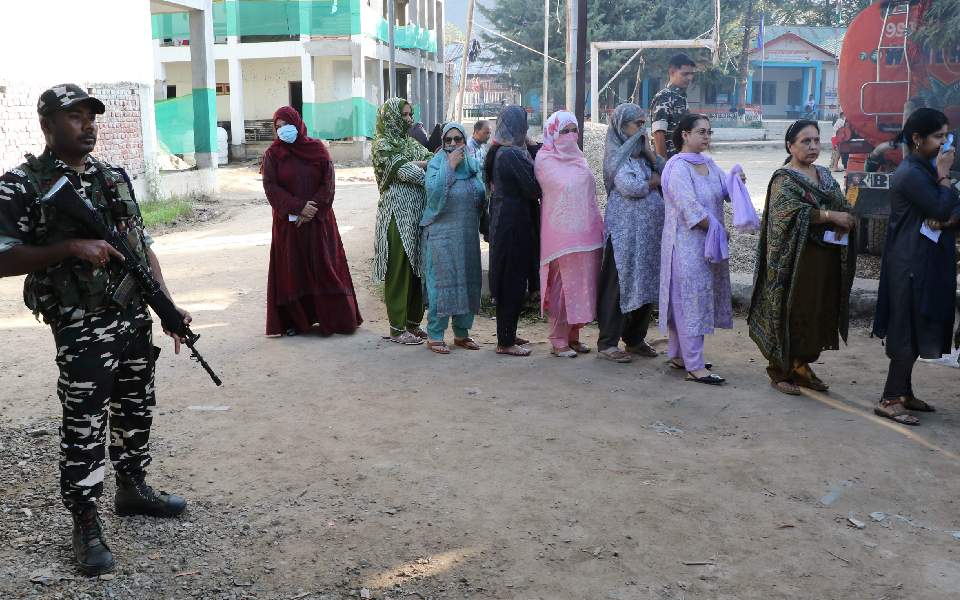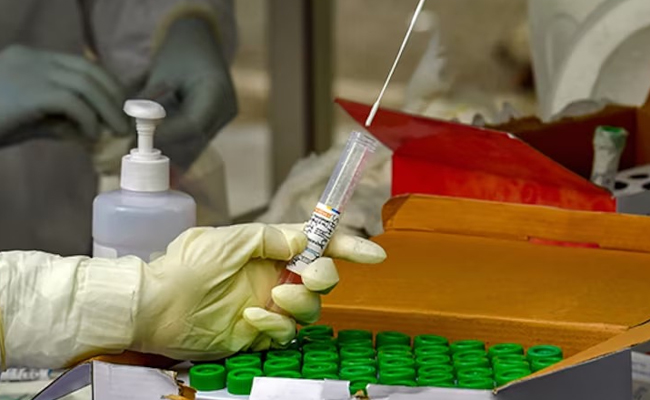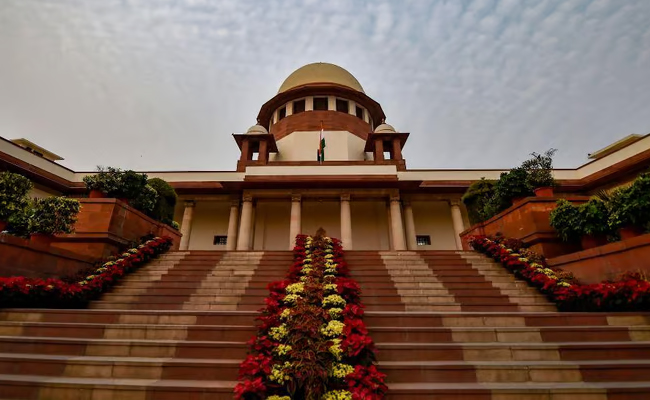Jammu, Sep 18: A voter turnout of about 59 percent -- "the highest in the past seven elections" -- was recorded in the first phase of assembly polls in Jammu and Kashmir on Wednesday, Chief Electoral Officer P K Pole said.
However, these are tentative figures and may rise after the final reports are received about postal ballots, and from remote pockets like Marwah, Wadwan, Dachhan and Machail in Kishtwar, the officer said.
Briefing mediapersons here after polling ended at 6 pm, Pole said the elections -- which covered 24 seats in seven districts -- ended peacefully without any untoward incident.
There are reports of some minor incidents of scuffle or argument from a few polling stations but "no serious incident" occurred that could have forced a repoll, he said.
Over 2.3 million voters were eligible to cast the ballot to determine the fate of 219 candidates, including 90 Independents.
"The polling percentage of 59 percent is highest in the past seven elections -- four Lok Sabha polls and three assembly elections," he said, attributing the increase in the voter turnout to various factors including improved security situation, active participation of political parties and candidates and a campaign by the department.
He said Kishtwar district recorded the highest 77 percent turnout, while Pulwama district witnessed the lowest 46 percent.
Doda district recorded a turnout of 69.33 percent, Ramban district 67.71 percent, Kulgam district 61.57 percent, Anantnag district 54.17 percent and Shopian district 53.64 percent.
In the 2014 assembly elections, the district wise poll percentage was: Pulwama 44 percent, Shopian 48 percent, Kulgam 59 percent, Anantnag 60 percent, Ramban 70 percent, Doda 73 percent and Kishtwar 76 percent.
In Kishtwar districts, he said, the Padder-Nagseni segment recorded the highest 80.67 percent voting followed by Inderwal (80.06 percent) and Kishtwar (78.11 percent).
In the nearby Doda district, Doda west segment recorded 75.98 percent, Doda (70.21 percent) and Bhaderwah (65.27 percent).
In Ramban district, Banihal segment recorded 71.28 percent and Ramban 67.34 percent, he said.
Among the seven constituencies of Anantnag district, Pahalgam recorded the highest voter turnout at 67.86 percent, followed by Kokernag (58 percent), Dooru (57.90 percent), Srigufwara-Bijbehara (56.02 percent), Shangus-Anantnag (52.94 percent), Anantnag West (45.93 percent) and Anantnag 41.58 percent, Pole said.
In Pulwama district, the CEO said, the Pulwama segment witnessed 50.42 percent polling, followed by Rajpora 48.07 percent, Pampore 44.74 percent and Tral 43.21 percent.
In Shopian district, the Shopian segment recorded a voter turnout of 54.72 percent and Zainapora 52.64 percent.
In Kulgam district, D H Pora recorded a turnout of 68 percent, Kulgam 62.70 percent and Devsar 57.33 percent, Pole said.
He said seven districts of south Kashmir had been traditionally low poll percentage constituencies and in some of the past elections, the percentage had not even crossed the single digit.
Asked about a social media video purportedly showing a policeman losing temper and aiming his gun before being overpowered by his colleagues outside a polling station in Kishtwar, he said the district election officer and the returning officer concerned have taken note and issue was resolved amicably.
PDP and BJP candidates were involved in an argument at the polling station.
Pole expressed hope that the remaining two phases on September 25 and October 1 will also see high polling percentage.
Meanwhile, the election commission expressed satisfaction over the long queues of voters at the polling stations showcasing the entire world, the deep trust and confidence of the people of J&K in the democratic exercise.
The polling was held across 3,276 Polling Stations in the seven districts and 24 special polling stations set up for migrant pandits in Jammu, Udhampur and Delhi.
According to officials, 31.42 percent of the more than 35,000 eligible kashmiri migrant voters exercised their franchise. While 27 percent cast their votes at 19 polling stations in Jammu, 40 percent at four polling stations in Delhi and 30 percent at one polling station in Udhampur.
In each of the seven districts where voting was held in the first phase, the voter participation exceeded the participation during the Lok Sabha 2024 elections, the election commission said in a release.
The performance builds on the trend witnessed during the Lok Sabha elections in Jammu and Kashmir which saw a voter turnout of 58.58 percent at polling stations, highest in the last 35 years.
Voting began at 7 am and proceeded steadily through the day. Men and women, the young and old, some too frail to walk and others patiently waiting their turn, queued up outside polling booths across Kashmir Valley and Jammu.
Security forces fanned out to ensure that there was no trouble. The day was largely without incident except for reports of clashes between political workers in some areas of Bijbehara and D H Pora.
Let the Truth be known. If you read VB and like VB, please be a VB Supporter and Help us deliver the Truth to one and all.
Bengaluru: Justice John Michael D’Cunha’s committee has uncovered significant irregularities in the procurement of medical supplies during the Covid-19 pandemic, revealing that more than 16 lakh RT-PCR test kits purchased by Karnataka in 2022 under the BJP-led government were either expired or close to their expiry dates.
After irregularities in PPE kit purchases, ventilators have also come under the scanner, with the report highlighting discrepancies amounting to Rs 173.26 crore in purchases made by the Medical Education Department.
The commission has also found that the Karnataka State Medical Supplies Corporation Ltd. (KSMSCL) that cancelled a supply order for one lakh Rapid Antigen (RAT) kits placed with a Singapore-based company in March 2020 — for delay in supplying — has not recovered the Rs 6.99 crore paid to the company towards the order, as reported by The Hindu on Thursday.
According to the 279-page report on procurements made by the KSMSCL that is compiled in part IV of the report, a payment of Rs 148.84 crore was made by KSMSCL to various suppliers and firms towards procurement of RT-PCR kits from 2020 to 2022.
The Commission’s report, as cited by the publication, stated that there were records indicating procurement of RT-PCR kits, RNA extraction kits and Viral transport media (VTM) of a total value of Rs 106.25 crore during the pandemic in Karnataka. However, according to the report, this procurement was made without administrative approval.
“Since the KSMSCL has failed to discharge its obligation and responsibility, the loss caused to the State exchequer to this extent is required to be replenished by the erring officers and/or officials of the KSMSCL as well as the officers and/or officials of the consignee designated laboratories who received the consignment,” the report said, pegging the losses due to expired kits supplied by companies at Rs 3.11 crore.
In response to the report’s findings, state Health Minister Dinesh Gundu Rao criticised the saffron party for profiting from the pandemic. He promised accountability for the irregularities involving PPE kits and ventilators, stating that those responsible would face punishment.





